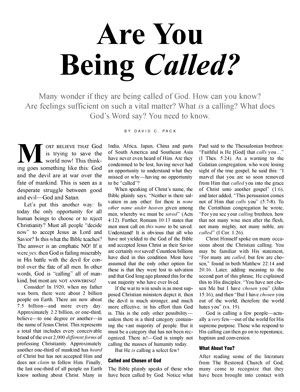Around the world, millions of people become professing Christians every year. Some are baptized babies, others young adults who have joined the church of their choice—and others adult converts reached by missionaries. Of course, many “believers” are never baptized. Most of the rest are not correctly baptized.
On Pentecost, in A.D. 31, the day that the New Testament Church was created, the apostle Peter gave a powerful sermon to many listeners. His message was so convicting that 3,000 people were baptized. Before their baptism, many asked him, “Men and brethren, what shall we do?” (Acts 2:37). Peter’s answer was, “Repent, and be baptized every one of you in the name of Jesus Christ for the remission of sins, and you shall receive the gift of the Holy [Spirit].”
This verse is God’s plain command to “be baptized”! Not only is this instruction in your Bible, but the Bible also says repentance must precede baptism or one will not receive the gift of the Holy Spirit.
Most believe that there are no requirements—no conditions—to being saved. This is untrue and the above verse proves there is at least one condition that must precede baptism itself—repentance! Some of those who teach that there are no conditions for salvation often quote Romans 10:9, 13. Paul writes in verse 9, “That if you shall confess with your mouth the Lord Jesus, and shall believe in your heart that God has raised Him from the dead, you shall be saved.” Verse 13 appears to make it even easier: “For whosoever shall call upon the name of the Lord shall be saved.”
What could be simpler for would-be Christians? How often have you heard that all one must do is “believe in your heart”? But is there more to this verse than meets the eye?
Many speak of having had a “religious experience” that instantly turned them into Christians. I once lived next door to a woman who told me that she “just knew” that she was a Christian because, as she put it, “I locked Jesus and the Bible up in my heart when I was nine years old.”
So many believe that this is all that is necessary for conversion to occur. Others believe that “Christ did everything on the cross for me,” or “I am saved by grace alone without conditions.” What about the many millions who believe these ideas? Is this all there is to salvation? Are Romans 10, verses 9 and 13, the only verses that should concern you?
Under the Death Penalty
Romans 6:23 says, “the wages of sin is death; but the gift of God is eternal life through Christ Jesus.” I Timothy 6:16 says, “[Christ] only has immortality.” In addition, Romans 3:23 says, “For all have sinned, and come short of the glory of God.” These three verses prove that no human beings have inherent immortal life. God told Adam, “…dust you are, and unto dust shall you return” (Gen. 3:19). Human beings are made out of simple dirt—earth—and nothing more. This is what they will return to after death.
The apostle John was inspired to write, “And this is the record, that God has given to us eternal life, and this life is in His Son. He that has the Son has life; and he that has not the Son of God has not life” (I John 5:11-12).
Unless human beings have a Savior—One who pays the penalty for their sins—they are headed for death, not immortality! Many more verses could be cited to prove this. The good news is that God—and only God—does hold the power to grant the “gift” of eternal life (John 5:26). Make no mistake! It cannot be earned—it is a free gift. But it is a gift given with conditions—to those who qualify!
Most Christians believe they are “saved by the blood of Christ.” This is not true. The Bible says that we are “saved by His life” (Rom. 5:10), while we are “reconciled to God” and “justified by His [Christ’s] blood” (5:9). Also see I Corinthians 15:17-18. This is vital to understand and requires some explanation.
Consider! If Christ is not risen from the dead, then He cannot send His Holy Spirit to beget Christians. Recall that Peter said repentance and baptism would lead to the receiving of God’s Holy Spirit. A Christian is one who is led by the Holy Spirit. Paul wrote, “For as many as are led by the Spirit of God, they are the sons of God” (Rom. 8:14). It is this same Spirit in Christians that God will use to eventually change them into Sons of God composed of Spirit—resurrected Spirit Beings. It is this Spirit in them that, when they are changed, makes eternal life—salvation—possible. Is this clear? If Christ had not been resurrected, He could not have gone to heaven where He could send His Spirit to Christians. Without this Spirit living in the mind of a Christian, there is no hope of eternal life.
Romans 8:11 says, “But if the Spirit of Him that raised up Jesus from the dead dwell in you, He that raised up Christ from the dead shall also quicken your mortal bodies by His Spirit that dwells in you.” At the resurrection, one previously begotten of God will have become born of God. Prior to this new birth (John 3:3-6), a Christian is merely an heir—and not yet an actual inheritor (of eternal life). In this life, a Christian is like an impregnated egg in the womb. The baby’s birth comes nine months later. In this same way, a Christian’s birth into God’s kingdom comes well after the time of begettal and conversion.
A Christian has been converted to a new way of life. He seeks to change—to become more like Jesus Christ every day. He also seeks God on a daily basis. He exercises the Spirit of God to develop His very character—through a daily renewing of the mind! Galatians 5:22-23 lists the nine “fruit[s] of the Spirit,” identified as love, joy, peace, longsuffering, gentleness, goodness, faith, meekness and temperance. These qualities of God’s nature are practiced and reflected when His Spirit is present in a human being.
Paul wrote in II Timothy 1:7, “For God has not given us the spirit of fear [timidity]; but of power, and of love, and of a sound mind.” A true Christian is actively working on all three of these qualities, which spring from God’s character and Spirit. He is striving to develop the love of God. He regularly asks God to give him a sound mind and the power to grow, change and become more like Jesus Christ in word, thought and deed! It is the Christian’s goal to grow in every possible way. Peter wrote, “But grow in grace, and in the knowledge of our Lord and Savior Jesus Christ” (II Pet. 3:18). If Christianity were merely a single moment of decision to call on Christ’s name, then why does the verse say to grow?
What would be the point of this instruction?
Christ said, “But he that shall endure unto the end, the same shall be saved” (Matt. 24:13). Here is another verse showing that for one to be saved, there is more required than to “just believe.” Christianity represents a need for endurance—a need to stay the course when it is not easy! And it is not always easy to obey God’s Law and yield to the government of God in one’s life.
True Christianity is not a “cakewalk.” It is not taking the path of least resistance, with no need to grow, change or endure difficult challenges and tests! Christ said, “Enter you in at the strait [difficult] gate: for wide is the gate, and broad is the way, that leads to destruction, and many there be that go in thereat: Because strait is the gate, and narrow is the way, that leads unto life, and few there be that find it [Greek: are finding—present progressive tense]” (Matt. 7:13-14).
It should now be clear that receiving God’s Spirit is not an end in itself, but rather the beginning—the start—for a newly-begotten Christian. Compare Romans 8:9 with I John 5:12 and two things become indisputable. A person must belong to Christ and he cannot belong to Christ unless he has been begotten by God’s Spirit.
But how does one reach the point when the Spirit of God is given?
“Repent and Believe”
The first words the Bible records from Christ’s mouth are found in Mark 1:15. He said, “Repent you, and believe the gospel.” It has been made clear that repentance is tied to baptism and conversion. But it is also tied to believing the gospel of the kingdom of God. Both of these represent commands—requirements—conditions—for one to become a Christian!
The world is ignorant of the true gospel. It is preoccupied with the Person of Jesus Christ instead of the message that He brought. He spoke continually about the kingdom of God that is soon to come to this world! (Read our free booklets Which Is the True Gospel? and What Is the Kingdom of God? to learn more about the deception that has hidden this vital knowledge from the world.)
The word repent means to change—to stop sinning! But what is sin? The Bible answers, “Whosoever commits sin transgresses also the law: for sin is the transgression of the law” (I John 3:4). While many have heard of sin, almost no one understands what it is—its definition. There must be no misunderstanding what is meant here.
The command to “believe the gospel” means to believe the good news of the coming kingdom of God. The word gospel comes from god spell, meaning good news. God’s government coming to earth is good news. Those who yield to God must be willing to believe the gospel. With this soon-coming government will be the institution of God’s laws all over the earth. Peace, abundance, happiness and joy will “break out” everywhere. No wonder Christians are instructed by Christ to regularly pray, “Thy kingdom come” (Matt. 6:10)!
The two conditions for salvation described in Mark 1:14-15 are the same as in Acts 2:38—repent and believe! Again, Peter said, “Repent, and be baptized every one of you in the name of Jesus Christ for the remission of sins, and you shall receive the gift of the Holy Spirit.” God’s Spirit cannot be given unless there is absolute belief (faith) in the sacrifice—the death, burial and resurrection of Jesus Christ. Baptism represents—symbolizes—complete faith (belief) that Christ’s sacrifice applies to each person who exercises this faith.
When Philip the deacon was counseling the Ethiopian eunuch for baptism, the eunuch asked him, “What does hinder me to be baptized? And Philip said, If you believe with all your heart, you may. And he answered and said, I believe…” (Acts 8:36-37). In verse 38, Philip baptized the eunuch.
God has promised that where there is repentance and faith (belief), He will give His Holy Spirit. When God promises, He keeps His word. He does not compromise or forget. He makes it clear that there are conditions to receiving the gift of His Holy Spirit.
Therefore, water baptism, symbolizing repentance and belief, is a commanded condition to receive salvation!
Was Jesus Baptized?
What was Jesus’ example in regard to baptism? Since He had no sin to repent of, He certainly did not need to be baptized. Peter was inspired to record, “Christ…leaving us an example, that you should follow His steps” (I Pet. 2:21).
Notice Matthew’s account of Christ’s example. Christ came to John the Baptist “to be baptized of him” (Matt. 3:13). Verse 16 states, “Jesus, when He was baptized, went up straightway out of the water.” The rest of this verse records Christ’s symbolic receiving of the Holy Spirit, descending upon Him like a dove. As this occurred, a voice from heaven said that God was “pleased” with His “beloved Son.” True Christians are also God’s sons. May God be as pleased with each of us as we seek to overcome the temptations of sin that Christ overcame!
Baptizing by Christ’s Authority—in His Name
What does it mean to be baptized “in the name of Jesus Christ”? The Royal Canadian Mounted Police used to say, “Stop in the name of the law!” If a policeman tells someone to “stop in the name of the law,” all of us recognize that this means stop “by the authority (the power, the office) of the law.” There is supreme authority in God and His Law. Christ grants His authority to certain actions. Baptism is one of them.
Notice! The Bible says Jesus Christ baptized more people than John the Baptist did. Were you aware of this? Were you also aware that the Bible says that Christ baptized no one? How could both statements be true? Actually, we will see that Christ had His disciples baptize many people. Notice John 3:22: “After these things came Jesus and His disciples into the land of Judea; and there He tarried with them, and baptized.” This verse plainly says that Christ baptized. Notice further in 4:1: “When therefore the Lord knew how the Pharisees had heard that Jesus made and baptized more disciples than John, (though Jesus Himself baptized not, but His disciples).”
This is an important scripture. Why? How can it be that Christ baptized many, when He actually baptized no one? Simply this: Christ authorized His disciples to baptize on His behalf—in His Name—and God attributes this physical work of baptizing to Him. It was as though He actually did the baptizing Himself, because His disciples were doing it in His Name. They did it for Him, in the sense that they did it by His authority—and it was considered as though He did it Himself.
Christ tells Christians, “Whatsoever you shall ask in My name, that will I do” (John 14:13), and “If you shall ask anything in My name, I will do it” (vs. 14). For emphasis, in two successive verses, Christ says almost exactly the same thing. Christians receive answers to prayer as a direct result of praying in Christ’s name. John 16:23 makes this more plain: “And in that day you shall ask Me nothing…whatsoever you shall ask the Father in My name, He will give it you. Hitherto have you asked nothing in My name” (vs. 24). The point is that the Father answers prayer if we come to Him by Christ’s authority—in His name! It has been said that Christ has delegated to Christians “power of attorney” to act on His behalf, or for Him, in their prayers. In this way, Christians are authorized by God to perform numerous tasks in His Name.
Baptism Plainly Commanded
We have established that Peter commanded repentance, followed by baptism. Now notice Acts 17:30: “And the times of this ignorance God winked at; but now commands all men everywhere to repent.” This point must be made. God commands repentance, and repentance precedes baptism. Therefore, it could just as surely be said, “God commands all men everywhere to be baptized” or “to repent and be baptized.”
Christ directly commanded His disciples to baptize people so they could be saved. He actually tied salvation directly to baptism. He made it a condition to receive eternal life. His disciples always practiced baptism when new disciples were being converted. Acts 2:41 says, “Then they that gladly received His word were baptized.” Acts 8:5, 12 says, “Then Philip went down to…Samaria…But when they believed Philip preaching the things concerning the kingdom of God [notice this same message tied to what new converts must come to believe], and the name of Jesus Christ, they were baptized.” There are those who will say that this was merely “baptism by the Holy Spirit.” Verses 15-16 make this explanation impossible because Peter and John, “…when they were come down, prayed for them, that they might receive the Holy Spirit: (For as yet [it] was fallen upon none of them: only they were baptized in the name of the Lord Jesus.)”
If the baptism of these converts was merely a baptism “by God’s Spirit,” then how could the scriptures say that these people had been “baptized,” when God’s Spirit had, as of yet, “fallen upon none of them”? This makes no sense—unless baptism and the receiving of God’s Holy Spirit are two totally separate events, just as Acts 2:38 stated!
When the Gentile Italian, Cornelius, and his family were baptized, in Acts 10:44, 47-48, a very direct statement is made about the need to be properly baptized. Peter was used by God to give the first sermon to the Jews discussing baptism (Acts 2). Ten years later, in A.D. 41, He also used Peter to be the first apostle to preach the gospel to the Gentiles. (Paul was later chosen to be the apostle to the Gentiles.) The devout family of Cornelius received “the gift of the Holy Spirit” (10:45). In this unique circumstance, now that they had received the Holy Spirit in advance of baptism, Peter’s immediate response was “Can any man forbid water, that these should not be baptized…And he commanded them to be baptized in the name of the Lord.”
This is an unmistakable command to be baptized in water!
Christ’s Great Commission Included Baptism
As has been stated, Christ directly commanded His disciples to baptize. Notice Mark’s gospel account of Christ’s Great Commission to His disciples: “And He said unto them, Go you into all the world, and preach the gospel [of the coming kingdom of God] to every creature. He that believes and is baptized shall be saved; but he that believes not shall be damned” (16:15-16). Belief without baptism is not sufficient to be saved!
Matthew 28:19-20 also records Christ’s same instruction, but adds some points and excludes others that Mark does not. (This is the same commission, so both accounts must be taken together.) Matthew records, “Go you therefore, and teach all nations…” This had to include teaching the gospel of the kingdom of God because Mark mentioned this. The verse continues, “baptizing them in the name of the Father, and of the Son, and of the Holy Spirit: Teaching them to observe all things whatsoever I have commanded you.” In His Great Commission to His disciples, the scripture states plainly that Christ commanded baptism!
It is important to note that this scripture explains that baptism is done “in the name of the Father, and of the Son, and of the Holy Spirit.” The word “in” should be properly translated “into.” While Acts 2:38 says to be baptized “in the name of Jesus Christ,” Matthew’s account uses the longer phrase. Does scripture contradict itself? Can it be broken or invalidated—sometimes by another scripture? John 10:35 says that it cannot. This is impossible. The Bible never contradicts itself. If it did, it would not be worth the paper it is written on!
Baptizing in Jesus’ name and being baptized into the Father, Son and Holy Spirit are two entirely different points. The first speaks to the issue of authority to baptize on behalf of Christ—one either has or does not have the authority to baptize. The latter speaks to the issue of being baptized into the Family—the Godhead of the Father, Son and (power of the) Holy Spirit. (Though this booklet is not intended to address this issue, it must be noted that this is not referring to the unbiblical doctrine of the trinity, which denies the very meaning of the kingdom of God.) God is a Father who is reproducing Himself—adding many children into His family. He is not “three persons in one,” forming a closed Godhead. The trinity first appeared as a teaching in the great, false “Christian” church in the third century A.D.—centuries after Christ had built His Church. It was imported into the church as a counterfeit to replace the truth that God is expanding His Family. (You may read our free book The Trinity – Is God Three-In-One?
What Is the Right Mode of Baptism?
What is the proper form of baptism? Is it sprinkling, pouring or immersion? Not only must people follow God’s command to be baptized but baptism must be performed in the manner—the method—that God commands. Otherwise, the baptism is invalid. It is as if it had never occurred.
We must ask what the word baptize means. Does it mean to sprinkle? Does it mean to pour? The answer lies in the meaning of the particular Greek word used wherever the words baptism or baptize are found in the New Testament.
First, it is vital to recognize that baptize is actually a Greek word. It is not an English word! The reader is probably aware that the New Testament was written in Greek and translated into English. The word baptize represents a departure from this pattern of the translators in 1611 (when the King James Version of the Bible was translated). When the translators came to the word baptizo, they chose to leave it untranslated as “baptize.” The question of which is the proper method would have been eliminated had they properly translated it into its true meaning: immerse, dip or put into! The English word “pour” derives from the Greek word cheo and “sprinkle” derives from rantidzo. God chose the word baptizo because He did not want sprinkling or pouring to represent the proper symbol of conversion!
Second, consider the matter in this way. One cannot be immersed by pouring or sprinkling—one can only be poured or sprinkled by pouring and sprinkling. Likewise, one can only be immersed by being immersed. God says what He means and means what He says!
It is no wonder then that when John the Baptist was baptizing people, he chose locations “because there was much water there” (John 3:23). This would not have been necessary for sprinkling or pouring. It is also no wonder that when Philip was baptizing the Ethiopian eunuch it says, “they went down…into the water…and he baptized him. And when they were come up out of the water…” (Acts 8:38-39). This verse does not fit with merely using a little water to sprinkle or pour over a person’s head. Finally, it is also not difficult to see why Matthew 3:16 would record that after Christ was baptized, He “went up straightway out of the water.”
None of these verses are consistent with either sprinkling or pouring. The clear Bible pattern is that baptism requires a lot of water, because people go into it and then come up out of it.
What Does Baptism Picture?
There is an all-important reason why God does not accept sprinkling or pouring. While it should be enough that He commands a thing for us to obey without question, it can be important to understand why God says to do something His way. This is true of baptism.
The symbolism of being completely immersed in water has great meaning. Baptism symbolizes death, burial and a rising, or resurrection, from a grave. This is exactly the pattern of Christ’s crucifixion, burial and resurrection. Neither sprinkling nor pouring reflects this symbolism. Consider Romans 6:3-5: “Know you not, that so many of us as were baptized into Jesus Christ were baptized into His death? Therefore we are buried with Him by baptism into death: that like as Christ was raised up from the dead by the glory of the Father, even so we also should walk in newness of life. For if we have been planted together in the likeness of His death, we shall be also in the likeness of His resurrection.” True Christians will be resurrected at the time of Christ’s Return to earth.
Also, Romans 6:6-7 further shows that true Christians are “crucified with Him,” and are “dead” and “freed from sin.” There is no mistaking the death, burial and resurrection symbolism of immersion (baptism) in water.
Additionally, Paul recorded, “Buried with Him in baptism, wherein also you are risen with Him through the faith of the operation of God, who has raised Him from the dead” (Col. 2:12). Verse 13 continues, “And you, being dead in your sins…has He quickened together with Him, having forgiven you all trespasses (sins, I John 3:4).” A baptized person is a forgiven person—freed from sin and “walk[ing] in newness of life.” This is the plain truth from God’s Word!
A Christian has started his life over. His old life is dead and gone. He is a changed person whose past is wiped clean—buried in a grave—“for you are dead…hid[den] with Christ in God” (Col. 3:3). What a wonderful, inspiring truth for those who choose to walk this path. God commands baptism so that people can recognize that they have begun again, and that they have a Savior—if they express faith in Him and accept His sacrifice. Christ, as Savior, will then send His Holy Spirit and help Christians grow and change.
Our goal is to become like God in character now so that we can rule with Him later in His kingdom—thus fulfilling our incredible human potential! (Read our free book The Awesome Potential of Man to learn more.)
Not Joining a Church or Denomination
We all know people who say, “I am affiliated with this church,” “I joined that church” or “I changed to another church.” Millions join or change their church affiliation every year—thousands every day. Can a person join the true Church of God? After baptism, into what has a person been baptized? We just quoted Romans 6:3. Recall that it said we are “baptized into Jesus Christ.” Christ explained that we are “baptized into the Father, the Son, and the Holy Spirit.” Nowhere does the Bible say that we are baptized “into either a denomination or some particular church organization.”
This is extremely important to understand! Many have become confused because they believe baptism places them into some church corporation when the Bible does not say this—and it is probably not even technically, legally possible to be baptized into actual membership in a corporation, in most countries.
Do not misunderstand, however. The newly-begotten Christian is put into Christ’s Church. This requires some careful explanation to fully comprehend. There is, in fact, only one true Church, with all others, therefore, having been built by men and false as a result.
Typically, most churches will refuse to baptize people who will not “join their church.” This is scripturally incorrect. Why? A true Christian is put into the Church that Jesus Christ—not any man—built. Christ said, “I will build My Church” (Matt. 16:18). It is Christ—not any man—who is putting people into His Church, thereby building it. (To understand how to identify Christ’s Church and to see how He has preserved it throughout history, you may read our book Where Is the True Church? – and Its Incredible History!)
Exactly how does one become a member then of the true Church of God? Traditionally, many churches compete with one another, advertising for members. Does the Bible teach this? Paul wrote, “For by one spirit are we all baptized into one body” (I Cor. 12:13). He also wrote, “For as many of you as have been baptized into Christ have put on Christ” (Gal. 3:27). By putting these two verses together, we see that a Christian is baptized into the Body of Christ—not some church organization founded or built by men of this world.
Briefly, “the house of God, which is the church of the living God, the pillar and ground of the truth” (I Tim. 3:15) is the Bible’s definition of the Church. The Church is where the truth is found. It is “grounded” on the truth. It is then the house(hold) of God—His Church—because it is holding fast to, and is grounded upon, the truth. Of course, this includes the truth about the proper mode of baptism.
Here is the connection between being “baptized into Christ” and being “baptized into one body,” signifying baptism into the true Church of God. This must be made clear. Consider Ephesians 1:22-23. Speaking of Christ, it says, “and gave Him to be the head over all things to the church, which is His body.” Colossians 1:18 confirms this: “And He is the Head of the body, the church.” This pictures Christ inserting individual people into the body of His Church upon baptism! People can join baseball teams or social clubs (most churches are simply “religious social clubs”), but only Christ can put them into the Church that He is building. There is no such thing as an “independent” baptism by any supposed believer who wants to exist on his own apart from the one place where Christ is working. Christ’s true ministry must be involved—must authorize the baptism.
(Other verses describing and discussing the Body of Christ are Romans 7:4; 12:4-5; I Corinthians 10:17; Ephesians 4:4, 11-16; 5:30; Colossians 2:17 and all of I Corinthians 12.)
Let’s make this absolutely plain, so that none can miss it. One is baptized by the Holy Spirit into the biblical Body of Christ, but this Body is unified, organized and structured, and exists as the one true Church of God on Earth, directly guided and led by Jesus Christ Himself, not by any man or group of men. It exists for the purpose of carrying out the Work of God on Earth—preaching the gospel of the kingdom of God to all nations (Matt. 24:14; 28:19-20). The all-important understanding of the true gospel—the only one brought by Christ—was earlier referenced.
You cannot receive the Spirit of God unless you are baptized. You cannot be baptized unless you have repented. Remember, God’s command is “Repent, and be baptized,” and only then “you shall receive the gift of the Holy Spirit.” Men may have their traditions, ideas, and methods of baptism—or opinions about how one can receive God’s Spirit—but following God’s instruction is the only acceptable way!
Don’t Ever Delay Baptism
The New Testament has several accounts showing that we should not delay baptism once it is clear that the believer is repentant and ready.
When Paul (then named Saul) was to be baptized, God inspired Ananias to go perform it. Ananias’ reaction, immediately upon seeing Paul (Acts 22:16) was “And now why tarry you? Arise, and be baptized, and wash away your sins, calling on the name of the Lord.” Paul never forgot this. Notice, when he baptized the Philippian jailer with his family, it was some time after midnight, and yet Paul baptized him “the same hour of the night”—without even waiting for the next day to come (Acts 16:32-33). The reader will recall that the Ethiopian eunuch was baptized immediately after Philip counseled him (Acts 8).
It is important to note that sometimes it is not possible for a baptism to be performed as soon as is best or ideal. When Peter gave his sermon in Acts 2, all the original apostles were present with him and were able to immediately assist in 3,000 baptisms (Acts 2:39-41). While this is clearly the best way to do it, circumstances do not always permit this.
When Is a Person Ready for Baptism?
At what point should one decide to go forward with baptism? When is he or she ready for this step? How and by whom is this determined? These are all-important questions that must be considered. Some groups believe that a certain “probation period” should take place in order for a person to demonstrate that he has gained a great deal of knowledge toward readiness for baptism. Certainly some basic knowledge is required, but we have already shown that Christians “grow in grace, and in the knowledge” for the rest of their lives (II Pet. 3:18). Therefore, perfect knowledge is not something they are required to attain or achieve before baptism. Actually, by far the greatest amount of knowledge that will come to a Christian will come slowly but surely after baptism!
We have already read in Matthew 28:19-20 that repentance, belief of the gospel and being taught all things that Christ has commanded are essential in preceding proper baptism. Then, upon receiving the gift of God’s Spirit, Christians strive to grow through the guidance of that Spirit. It reveals truth and cleanses, corrects and renews the mind, while continually teaching people more and more about how to let Christ live His life in them.
The Bible says that God’s Law is “holy, just, good” and “spiritual” (Rom. 7:12, 14). While most people believe that the Law of God was kept by Christ for us—that He did away with it—the true Christian comes to understand, ever more deeply throughout his life, that the Spirit of God is essential to be able to keep the “spiritual” Law of God. It is through God’s Spirit that we understand His will, His mind. Yes, God grants repentance to a carnal mind (Rom. 8:7) before He actually converts that mind (John 14:17). But the next step should always be to move forward toward baptism so that a physical mind can be begotten and become one that is Spirit-led—though that initial amount of God’s Spirit is very small, leaving newly converted people still 99.9% carnal!
How does someone know that he has been given, or granted (Acts 11:18, II Tim. 2:25), the gift of repentance? As soon as he has been truly convicted about the depth of the sins in his past, then he has come to repentance. Of course, he must know what to repent of. The two verses preceding the command to repent and be baptized, Acts 2:36-37, depict an audience of listeners who were moved—even stunned—by the words of Peter’s sermon. They had just been told that “you have crucified” Jesus Christ. That was a shocking statement and the Bible records that they were “pricked in their heart” at this understanding. The Greek word, from which this phrase is translated, is katanusso and it means “to pierce thoroughly, agitate violently or sting to the quick.”
These are all stronger phrases than the one the translators chose, and they connote people who were torn up about what they had done! They were shocked and sobered that their own actions—sins—had actually played a direct role in crucifying Christ. (Remember, these disciples were not the Roman soldiers who did the physical nailing of Christ to the cross [stake].) This caused them to ask, “What shall we do?” Peter’s answer was to “change.” If Peter were speaking today, he would no doubt use this word (change) instead of the old King James English term repent, which, as previously explained, has the same meaning.
Near the end of his book, Job came to see a deep need to repent of his self-righteous attitude. The scripture records that he “abhorred himself” and “repented in dust and ashes” (42:6). The Hebrew word used here, maac, means “spurn, abhor, cast away, condemn, despise, disdain, loathe, refuse, reject, reprobate, utterly vile.” These terms create a powerful word picture of how the soon-to-be Christian should feel when he has been given the gift of repentance. Together with Acts 2:38, the picture becomes even clearer.
The word “convert” means the same thing, in that it literally means turn from. A Christian is one who turns from—changes from—a way of life of sin to God’s way of righteousness through the power of His Holy Spirit. The repentant mind is ready to do this for the rest of its life.
In addition to coming to repentance, the person seeking baptism should ask himself some important questions.
Have you absolutely proven that God exists? Hoping, suspecting, feeling, believing or thinking that He exists is not the same as proving He does! You should set out to prove this to yourself beyond any shadow of doubt!
Have you proven that the Bible is God’s inspired Word? Do you believe that it is His Instruction Book for mankind—or merely a nice book filled with good thoughts and helpful ideas? Have you proven that there is authority behind the Bible? Are you determined to “not live by bread alone, but by every word of God” (Luke 4:4)?
Have you proven where His True Church is? Well over 2,000 different denominations exist in the United States alone. While some would say, “they can’t all be wrong,” the truth is, “they can’t all be right.” We saw that Christ built His Church—and it is not divided (Matt. 12:25; I Cor. 10:13). We saw that it stands on and teaches the truth (I Tim. 3:15; John 8:31-32). It does not mingle it with error (Gen. 2:17). Christ (not men) rules His Church. Have you satisfactorily proven to yourself where this Church is?
For answers to the above questions, read our booklets Does God Exist?, Bible Authority...Can It Be Proven? and, once again, our book, Where Is the True Church? – and Its Incredible History!
Christ spoke about “counting the cost” of becoming His disciple (Luke 14:25-30). Before you buy a house, a car, or even a wristwatch, you would consider the cost. Many people make purchases that they are not prepared for. They over-extend themselves and do not properly plan for unexpected hard times that can make meeting their regular payment responsibility more difficult. Improper financial planning can cause homes to be foreclosed and cars to be repossessed.
True Christianity works the same way. God offers you a salvation so glorious and wonderful as to defy description. However, it does not come without a personal price. Friends and relatives may view you differently or shun you. Cherished traditions must be left behind. You may be misunderstood or have to endure persecution. Are you willing to trust Christ and possibly lose your employment to follow Him? Are you prepared to always put God first, no matter the personal price?
Many question how they can know for certain that God is calling them. A calling from God means that you understand the truth when you see, read or hear it. (Read our article “Are You Being Called?” to be certain if this means you.) God is giving you—exposing you to—knowledge that you did not have before. James 4:17 says, “Therefore to him that knows [has knowledge] to do good, and does it not, to him it is sin.” This becomes extremely serious because Hebrews 10:26 says, “For if we sin wilfully after that we have received the knowledge of the truth, there remains no more sacrifice for sins.”
If God is calling you, you actually have no choice except to answer all of the above questions with “Yes!”
When a person has been counseled to fully understand the principles of repentance described in this booklet, he is ready to be baptized. Such a person should then proceed to be baptized just as soon as a true servant of God can become available to perform it.
Carefully read the following passages. In preparing for baptismal counseling, they will help you better understand whether, and to what degree, God has granted you repentance. These verses take a thorough look at human nature—something you will come to see in yourself in abundance if God has given you the gift of repentance. Study these carefully—even praying over them one at a time. Ask God to truly show you yourself. Isa. 55:7-9; Jer. 10:23; 13:23; 17:9; Ezek. 14:4, 6; 33:14-15, 36:31; Job 42:6; Psa. 39:5-6; Mark 7:20-23; Luke 16:15; Rom. 1:28-32; 3:10-18; 7:18, 21-23; 8:7; Gal. 5:19-21; Eph. 4:22; Col. 3:5-10; II Tim. 3:1-5; Titus 3:3; I Pet. 4:1-4; I John 2:15-16; Rev. 21:7-8; 22:14-15. (You should also read our booklet Did God Create Human Nature?)
Other Questions
A number of additional questions arise when people consider baptism. Just as the gift of repentance is granted to a person to begin him on the path of turning from the wrong way of life—through the process of both learning the truth and unlearning error—so a person must unlearn certain common fallacies associated with baptism. Several should be examined.
First, are ordained ministers the only people authorized by God to perform baptisms? How important is the spiritual condition, character or personal beliefs of the one who administers the baptism?
Consider John the Baptist. Was he a trained, ordained minister who had attended a Bible college or theological seminary of his time? He was not. Yet, John baptized a great many people—including Jesus! This is an important statement! As a matter of fact, Jesus was also not a “trained, ordained minister” after the fashion of the churches of this world. He was generally rejected and despised by the religious hierarchy and leadership of His time. He was persecuted, belittled, denigrated, even hated by the leaders of His time—the Bible records that they often sought to kill Him. This is because He was not recognized and was considered to be out of step—a non-conformist in nearly every way.
When the Ethiopian eunuch was baptized (Acts 8), Philip, who baptized him, was still a deacon. Philip did eventually become an evangelist, but only well after this account (Acts 21:8). We have discussed how Christ’s disciples baptized many people. None of His disciples were ordained when they did this. They had been baptized but did not yet have God’s Holy Spirit. Unlike John and Christ, they were not even converted!
We have also discussed how it is Christ who is putting you into His Church. Immerse means “put into.” Christ is “putting (you) into” His Body—His Church—at the moment of baptism! After the 3,000 were baptized on the first Pentecost of the New Testament Church, Acts records, “And the Lord added to the church daily such as should be saved” (Acts 2:47). It was Christ adding to His Church—not the ministers who performed the daily baptisms. So baptism is not the work of any human instrument. It is the “operation” (Col. 2:12) of Jesus Christ. The human instrument is not the critical factor in the ordinance of baptism.
Take your eyes off of men—put them on Christ and keep them there! Men can fall away, deceive people, sin or perform the baptism for reasons of self-glorification. These things are not relevant to Christ’s decision to place you into the Church that He is building. Learning, after your baptism, about the sins, deception or intent of the man who baptized you, cannot invalidate your baptism and does nothing to necessitate a re-baptism by another. If it did, you might require baptism over and over again until you found a worthy human instrument to perform it. And how long would it be before you could be absolutely certain that this next human instrument was never going to become untrue in some way?
Nowhere does the scripture say anything about possessing the kind of supreme divine insight that would be necessary to accurately discern the human being who is putting you under water. Judas was among the twelve disciples who were baptizing on Christ’s behalf! Did his later defection and betrayal invalidate all of the baptisms he had performed? Of course not!
Second, we should ask, who could do a baptism? We have already established that deacons may perform baptisms and that Christ’s unordained, unconverted disciples performed many baptisms. The latter were students (this is what disciples means) and Christ authorized them to baptize on His behalf. Their preparation to become apostles was not yet complete. While they were still unconverted, Jesus also gave them power to heal the sick, raise the dead, cast out demons in His name and preach the gospel of the kingdom of God (Matt. 10:1,7-8). But it was Jesus who authorized them. They carried out His commission for Him, while faithfully preaching the gospel of the coming kingdom of God. It was neither their perfection nor their ordination that was important.
Acts 8 records that, when performing baptisms in Samaria, Philip also performed miracles and cast out demons, while preaching the gospel of the kingdom of God. Peter and John did later come to Samaria, so it is obvious that Philip was not acting on his own authority. The apostles must have sent him because, in verse 14, upon hearing of many conversions by Philip, the apostles then sent Peter and John to Samaria. If Peter and John went to Samaria, at the behest of the apostles, the deacon Philip (a deacon is one who basically “waits on tables”—Acts 6:2-3), would never have acted on his own authority or without having been sent.
The New Testament does not place great significance on the particular person who is performing the baptism. Yet, the pattern is always that the person who does the baptism is a representative sent or authorized by a senior minister or elder, who may not have been able to be present himself. Such ministers would be part of the true Church of God.
Third, in an attempt to negate the need for baptism, some try to use “the thief on the cross” to prove that not everyone needs to be baptized to be saved. Is this true? By now it should be perfectly clear that baptism is a biblical command.
However, the thief on the cross represented extraordinary circumstances. He was in no position to obey the command to be baptized. It would have been impossible. It is not the literal act of baptism that saves us. Rather, it is Christ’s forgiveness and removal of the death penalty over us, His making us righteous through the entering of the Holy Spirit and our determined willingness to obey Him in circumstances that we can control, that does this. We do not need to worry or be concerned with things that we cannot control. God is merciful—and He always looks on the heart, the attitude of a person. Many years ago, I was present when an elderly, bed-ridden lady became a member of the Church. According to the biblical command, we laid hands on her head so that she would receive God’s Spirit. Her fragile condition made it impossible for her to be lifted into the water to be baptized. Those present never doubted the validity of her conversion.
Nevertheless, baptism is clearly a biblical command. Those who are able to be baptized should worry and be concerned about their own salvation if they neglect this command. For “God…now commands all men everywhere to repent” (Acts 17:30), and “The Lord is not slack concerning His promise, as some men count slackness; but is longsuffering to us-ward, not willing that any should perish, but that all should come to repentance” (II Pet. 3:9). These are plain commands from God. Disregarding or disobeying them certainly would end a person’s opportunity for salvation.
Fourth, should children be baptized? Hundreds of millions of people (and perhaps as many as two billion) attend the various popular “Christian” churches of this world. The baptism of infants and children is a very common practice among these churches. Here is the problem—this is not biblical!
But why?
The following points should be carefully considered. There is not one single place anywhere in the Bible recording the baptism of a child. Not one! When Philip was baptizing (Acts 8:12), it says, “they were baptized, both men and women.” There is no mention of children being baptized in this account. Children are simply not mature enough to comprehend baptism.
The Bible command is to “repent” and “believe.” Babies and young children are not capable of believing, or even understanding, the gospel of the kingdom of God. They cannot comprehend a great, world-ruling government, led by Christ and the resurrected saints, coming to replace the governments of this world. This is beyond a child’s ability to understand. Can a child really understand that Christ died for his sins? Is a child mature enough to understand the symbolism of the death, burial and resurrection of Christ and how it is paralleled in the baptism ceremony? Can a child comprehend receiving God’s Spirit, as a begettal in the mind—let alone all that this begettal should set in motion in his or her life? Obviously, not.
Babies have nothing to repent of, though young people have certainly done many things that they can, at least partially, see were wrong. It is true that many children are capable of temporary, shallow feelings of regret or remorse, but these are soon forgotten in the carefree world of a child’s life. Children quickly wander off to other things. I have never seen a child capable of understanding the meaning of baptism—and I have ministered to nearly 10,000 people for more than 30 years. Children are no more likely to endure the commitment involved in becoming a true follower of Jesus Christ than they are committed to marrying any boyfriend or girlfriend that they may have had in their young lives.
While some teenagers may mature earlier than others, most people do not reach true adult maturity until at least their early twenties. Age 18 is the minimum age at which a person is capable of grasping what baptism means. If you are a young person reading this booklet, give yourself time to season and mature, until you are absolutely sure that you know what you are doing and what is at stake in your decision to become a Christian. Yes, adults should not delay upon reaching repentance, but young people should delay, sometimes several years before taking the step of baptism.
When the self-righteous, hypocritical Pharisees came to John the Baptist for baptism, he told them, “Bring forth therefore fruits worthy of repentance” (Luke 3:8). They were adults. Young people also need to “bring forth fruits worthy of repentance.” I do not say this because young people are Pharisaical, but rather because they need time to see their own sincerity and conviction deepen. Young people need to know beyond any shadow of doubt that they have repented. Otherwise, they will lack the necessary confidence later that God has given them His Holy Spirit.
The path that we will travel on the way to the kingdom of God will require us to know with absolute certainty that we have God’s Spirit in us, helping us in every time of need!
Counseling for Baptism
We should consider the example of Paul. He actually baptized very few people himself. A contention had arisen in the Corinthian church about which apostle the brethren there wished to follow.
Notice I Corinthians 1:13-17: “Is Christ divided? Was Paul crucified for you? Or were you baptized in the name of Paul? I thank God that I baptized none of you, but Crispus and Gaius; lest any should say that I had baptized in mine own name. And I baptized also the household of Stephanas: besides, I know not whether I baptized any other. For Christ sent me not to baptize, but to preach the gospel.”
Similarly, I cannot personally baptize people scattered all over the earth. Representatives “stood in” for Paul (for different reasons and in different circumstances than mine) and performed baptisms that were ready to take place. Still, it is not important that I baptize you personally. I also do not want people to look to me in any kind of special way because, as has been previously explained, it is Jesus who puts you into His Church, not me or any other man. Even if I could personally baptize you—and I have baptized several hundred people—I would still only be doing it as a servant of Christ, acting on His behalf, not on my own! While our representatives are scattered around the world, they will do everything in their power, with God’s help, to work out a way to reach you. If God is calling you, He will work out a way for you to be baptized. You can have absolute faith in this!
A vital point: Some contact us believing they are already true Christians—that they already have the Holy Spirit leading them—but lacking proper baptism. They are merely looking for one to baptize them—to validate an assumed conversion. Grasp this. Without either sufficient understanding of true biblical doctrines, true repentance or knowledge of real conversion—all of this on top of a correct baptism—one is not a true Christian. Lacking any of these things, no matter what one has been told, he is not a Christian, and we cannot baptize.
After studying this booklet, along with many other truths of God, you may wish to counsel for baptism. Trained representatives are available to counsel, either in person or by phone—depending upon your location. But this is a decision that can be made only by you. You must “work out your own salvation with fear and trembling” (Phil. 2:12). We are here to assist you in the ordinance of baptism should you desire. We will never call on you or urge you into this step. You must “count the cost” (Luke 14:25-30) and decide whether you will answer God’s call.
The following quote comes from the conclusion of Mr. Herbert W. Armstrong’s booklet All About Water Baptism:
“[Many] are being converted—their lives changed—by this Work of God…
“Some, not realizing one of God’s own called and consecrated ministers could call and explain, answer questions, and even baptize, have joined one of the churches of this world. You cannot join the true Church of God—the Almighty God puts you in.
“But if you have questions about fellowship, doctrines or practice, repentance and baptism—or any questions about the Bible, or the Christian life, write to the address of our office…
“Weigh carefully the facts, according to your own Bible. Then make your decision and take what steps God shows you.”






























